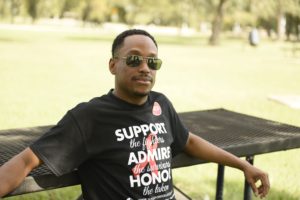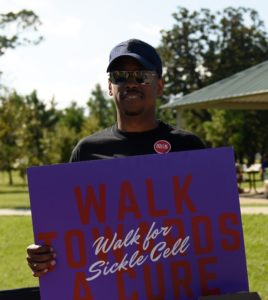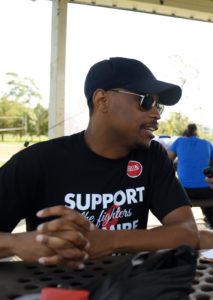
Carlyle, SCD Warrior
“[Sickle cell disease] affects my day-to-day life in pretty much every way. There’s really not a minute that you don’t feel off, like not your normal self. Being off is a steady state. So some days are good, pain is not too bad and I can do my normal day, whether it be work or hobbies on the weekends. And then some days are not so great where energy is even lower than it normally is, and pain’s higher than it normally is, and the day turns into a struggle.
I wish I worked only nine-to-five, but it’s a lot longer than that. And I’m in oil and gas…I’m in the oil and gas industry. […] I do work a lot. I take a lot of care to do energy management. Right? So if I know there’s something that’s going to be exhausting to me mentally, emotionally, or physically, then I really have to manage that around what I know I’m going to have to do that’s important. So whether I need to take breaks, or whether I need to take it easy one weekend because I know I’m going to have a busy weekend after that, then that’s what I do. […]
I live in Houston. I don’t have any direct family here. My mom’s outside Austin and the rest of my family is really spread out all over, mostly the East Coast, but the Eastern half of the United States. So I’m in Houston alone, but I have a good support system, especially with Sickle Cell Association of Texas Marc Thomas Foundation. I volunteer and help out with that and serve on the board as well. So they’re a good family support system in terms of care.”
In regards to school and achieving a degree in geology from the University of Texas, San Antonio.
“Honestly, I mean I didn’t get sick too often in high school, but you know that the energy thing is always a factor. So that’s been a factor from day one. So a lot of times it’s hard to do everything that you need to do and have the energy to sit there and study and focus. I can sleep anywhere, anytime. Put me somewhere 10 minutes quiet, I can take a little nap, no problem. So I think that’s probably the biggest challenge of schooling was like having the energy to sit, block things out and focus in a quiet place and have the energy to stay awake and focus on what you’re doing, for me.
In college, things changed a little bit. I got sick a little bit more often. I think that was a combination of things, stress being one of them. And so I had to retake classes, I had to drop classes. That pushes back the graduation date, obviously so.
I think it’s easy to think about the future a lot, and “Oh, my gosh, if I get sick” or “What’s my life going to be like?” and “How do I manage this, that and the other?” I try to just take a day by day or week by week approach. I don’t let the fear of what may happen or what would happen if, take control. And so that, in combination with just using quiet alone time, and trying to get enough sleep, and unsuccessfully at times, getting on a regimen for that probably helps the most.”
Spreading the word
 “I think with social media what it is, it’s kind of broadened the reach of what you can do when you have a organization that does advocacy work. So I think the [Marc Thomas] foundation’s great. I think getting the word out there is always tough, but when you have connections with doctors and hematologists and the medical community, it makes it easier to do that. And I think the education, the support that we bring makes it really a very easy choice for someone that’s suffering with sickle cell, or someone that deals with it in some capacity, whether it be a family member, to have a organization they can go to for whatever needs they may have.
“I think with social media what it is, it’s kind of broadened the reach of what you can do when you have a organization that does advocacy work. So I think the [Marc Thomas] foundation’s great. I think getting the word out there is always tough, but when you have connections with doctors and hematologists and the medical community, it makes it easier to do that. And I think the education, the support that we bring makes it really a very easy choice for someone that’s suffering with sickle cell, or someone that deals with it in some capacity, whether it be a family member, to have a organization they can go to for whatever needs they may have.
Mainstream, I don’t think it’s represented very well. I think within the community, of course. We know it, we deal with it, we know the struggle. But mainstream it doesn’t get the… it doesn’t get to be showcased like more prominent diseases, and I just say prominent, it’s not the word I mean, but you don’t hear about it as much as you do for other things that may not affect as many people even.
So I think there’s well over 100,000 people with sickle cell in the United States, and I think there are diseases with less impact, but they do get more coverage for some reason, a number of reasons for that. But that is something we’re trying to work on and trying to… we’re trying to change that obviously.
I think anytime you have something that affects the majority, minority populations, like sickle cell does, it’s always a uphill battle and there’s always going to be some stigmas associated when it’s affecting mostly minorities. But yeah, I would like to see it highlighted more, especially really within the medical community. I think we’ve all run into situations where you go into a hospital or a doctor and you expect there to be a level of knowledge and it’s not there. So I think even before the general population, we’d like it to be more highlighted within the medical population.[…]
In regards to what provides hope for the SCD Community

Carlyle, SCD Warrior
“[What provides] Hope? Organizations and events, where you have a large group coming together for the same cause. I think right now it’s an interesting time in the medical community, even though getting knowledge out there is not what it should be. There’s actually a lot of drug companies focusing on the disease right now. And I think within the next year, we’ll have two to four new medications out, whether they be in trials or approved by the FDA.
So it’s an exciting time. I think there’s a lot of things coming down the pipeline that are going to be a game-changer for people with the disease. And I don’t think… there’s never been a time in the past or present where it’s good to have sickle cell, but if there is a time to have it, it’s now. The most change is happening currently. So it’s a good time to kind of be in this organization and making sure our word’s getting out there and being able to see some of the benefits of the work that we’ve been doing.
I think healthcare, in general, is kind of at the forefront of a lot of the talks right now. And I think that affects us probably more than anyone else, more than a lot of other people. So I’d like to see those talks about healthcare progress. I know it’s a very complicated and nuanced subject, healthcare. And so I can’t say firmly right now, whether free healthcare for all is really the right answer, but I know that I do like the conversation that’s going on. And I know that the system now really is not working for a lot of people and there needs to be changes to that. So I like to see that healthcare talk continue, and more so address within that healthcare sphere specifically people and families that deal with chronic disorders and diseases because they have a very different experience within the healthcare that a normal person does. We have to figure out a way to kind of qualify that. So yeah, definitely healthcare is one of them.”